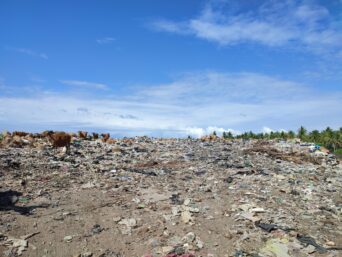The SeaCleaners completes actions in Indonesia
Awareness and education
Indonesia
Plastic pollution
25 March 2024
For several months in Indonesia, The SeaCleaners has been providing technical and financial support to two local associations, Peduli Alam in Amed (Bali) and Gili Eco Trust in Gili Trawangan, to develop their sorting centres in order to optimise waste treatment in these areas. We are very proud to announce that we have recently completed these two waste management projects!
Report at the end of March: two projects successfully completed!
The Gili Eco Trust sorting centre redesigned
Working with Valorplast, The SeaCleaners has embarked on an ambitious project to redesign the existing sorting centre in Indonesia. After obtaining government approval in October 2023, work began rapidly and is now nearing completion.
This innovative project marks a major turning point in waste management on the island. Instead of waste ending up on open dumps, it is now directed to the local sorting centre, where dedicated teams work to sort it meticulously. In this way, organic waste is separated from non-organic waste, including glass.
Once sorted, the organic waste is crushed and turned into compost, while the glass is transformed into ‘glass sand’. This versatile material is then mixed with cement to make bricks for local homes, offering a sustainable alternative to traditional construction.
Only residual waste is sent to landfill, significantly reducing the island’s environmental impact.
In addition, recyclable waste is now sorted into categories, such as metal and different types of plastic, before being compacted. It is then resold and shipped to Surabaya, where it undergoes a transformation process to be reintroduced into the production chain in the form of new objects or plastic flakes.
After months of hard work, the progress made in redeveloping the sorting centre is impressive. Here’s an overview of the different stages:
Completed: The entire interior refit was successfully completed, marking a significant change from the original plan. The changes were made specifically to facilitate the processing of glass, enhancing the overall efficiency of the centre.
In progress: At present, the section dedicated to composting organic waste is being built outside the centre. This phase involves digging work to prepare the necessary infrastructure for this essential process. At the same time, the team is also engaged in creating educational panels that will be used to raise awareness in the local community about waste management practices and the importance of environmental sustainability.
Not carried out: Contrary to initial plans, the project to install a pyrolysis system was not carried out. However, this decision resulted from the discovery of a viable local alternative, which was preferred for financial and practical reasons.
These developments demonstrate the ongoing commitment to effective waste management, while adapting to the challenges and opportunities encountered along the way. The local community can enthusiastically anticipate the environmental and social benefits that these improvements will bring in the long term.
The work of The SeaCleaners and Peduli Alam
In partnership with the Peduli Alam association, significant progress has been made in the Amed region of Indonesia.
The funding of a refuse truck and the construction of 20 metal bins are among the key achievements. In addition, the completion of the sorting centre represents a major stage in this project, including the construction of walls and roofs, the installation of water and electricity, and the acquisition of equipment such as sorting tables, a compactor, glass processing facilities, sorting bins and a weighing scale.
Efforts are currently being made to support educational and awareness-raising projects. This ongoing phase aims to strengthen community involvement and raise residents’ awareness of the importance of waste management and environmental preservation.
These initiatives demonstrate a concrete commitment to a cleaner, more sustainable future. By investing in infrastructure and carrying out educational initiatives, these efforts help to promote a culture of responsible waste management and raise awareness of environmental issues among the local population.


















